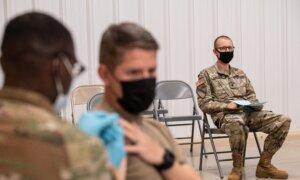FDA approval of the Pfizer COVID-19 vaccine was fast-tracked per Dr. Peter Marks’s request, despite internal concerns.
A U.S. Food and Drug Administration (FDA) official who pushed for expedited approval of Pfizer’s COVID-19 vaccine was pressed to explain why on Feb. 15 on Capitol Hill.
Dr. Peter Marks, director of the Center for Biologics Evaluation and Research at the FDA, was there to testify before the Select Subcommittee on the Coronavirus Pandemic about the nation’s vaccine injury reporting and compensation systems. But House Oversight and Accountability Committee Chairman James Comer (R-Ky.) had another line of questioning in mind.
“I want to talk about the vaccine approval process and some safety signals that were downplayed,” Mr. Comer said.
The FDA’s initial target date for approval of the Pfizer vaccine was Jan. 18, 2022. The officials who oversaw the approval process were Drs. Marion Gruber and Philip Krause, then-director and deputy director of the FDA’s Office of Vaccines Research and Review.
Citing documents and testimony obtained by the committee, Mr. Comer said that Drs. Gruber and Krause hesitantly agreed to move the target date up to Sept. 15, 2021, per Dr. Marks’s request. But when he asked that the process be sped up even further, they declined.
“According to them, after they declined, you and former FDA Commissioner [Dr.] Janet Woodcock relieved them from their roles in the approval process. They said that they felt ‘substantial pressure’ from you to approve this vaccine faster than they thought was defensible. My question is, did anyone instruct you to speed up the approval timeline faster than Sept. 15, 2021?”
Dr. Marks did not answer the question at first. Instead, he emphasized that the approval was fast-tracked due to the increasing number of deaths from COVID-19 and because “having an approved vaccine would help Americans feel more comfortable getting vaccinated.”
When asked again if he was instructed to shorten the timeline, the director clarified that it was his own decision.
When asked by Mr. Comer if he recalled that conversation, Dr. Marks replied, “I don’t know what you’re referring to. But there’s probably—it’s just a statement of fact that once you have a licensed vaccine, a mandate could be placed.”
He also acknowledged that myocarditis was a known safety signal at the time he was pushing for faster approval.
The Pfizer vaccine was eventually approved on Aug. 23, 2021—just one day before the military vaccine mandate was issued.
“That is interesting timing,” Mr. Comer said, though Dr. Marks said he did not recall directly discussing the approval timeline with the Department of Defense.
‘Words Matter’
Others who testified before the committee included Dr. Daniel Jernigan, director of the National Center for Emerging and Zoonotic Infectious Diseases at the Centers for Disease Control and Prevention, and Cmdr. George Reed Grimes, director of the Division of Injury Compensation Programs at the Health Resources and Services Administration.
In opening the hearing, Subcommittee Chairman Brad Wenstrup (R-Ohio) took a moment to remind the public health officials to be careful with their messaging on the COVID-19 vaccines.
“When you say safe and effective, that’s relative in your mind,” said Dr. Wenstrup, a podiatric surgeon. “It’s relative in your mind, but it’s not to the person at home. They hear 100 percent safe and 100 percent effective. That’s what they hear.”
Yet if that were the case, he noted, there would be no need for systems like the Vaccine Adverse Event Reporting System (VAERS) or the Countermeasures Injury Compensation Program (CICP), which compensates those who can prove they were injured by a COVID-19 vaccine.
While Dr. Wenstrup said he believed the COVID-19 vaccines had saved “hundreds of thousands of lives,” he noted that public health officials knew that the shot did not necessarily prevent people from contracting the virus.
“We never really heard that from the federal level,” he said. “We just heard, ‘It’s safe and effective.’ Now, we have a society that thinks that the polio vaccine and the other vaccines aren’t necessarily safe and effective, the way they have been.”
Dr. Wenstrup added that officials had also failed to adequately explain the difference between traditional vaccines and the mRNA technology in the COVID-19 vaccines.
“When people come to my office to tell me, ‘I had an adverse event of some type,’ I’m one-on-one with them. It’s not just something on a piece of paper. So, words matter.”
And that was a message the subcommittee’s top Democrat Rep. Raul Ruiz (D-Calif.), an emergency medicine physician, said he could agree with.
“What we say here today will have significant ramifications on whether millions of Americans will continue to place their trust in safe and effective vaccines, including the COVID-19 vaccine,” said Dr. Ruiz.
“As a physician and as ranking member of this select subcommittee, I want to ensure that today’s conversation remains rooted in the facts,” he said. “And the facts are that while delivering effective COVID-19 vaccines to the American people at a historic pace, our federal public health officials went to painstaking lengths to evaluate their safety, and they are continuing to do so.”
The CICP has received about 13,000 compensation claims from individuals who say they were injured by the COVID-19 vaccine. Thus far, only 40 of those claims have been approved for compensation. Eleven have been paid out.
Original News Source Link – Epoch Times
Running For Office? Conservative Campaign Consulting – Election Day Strategies!


